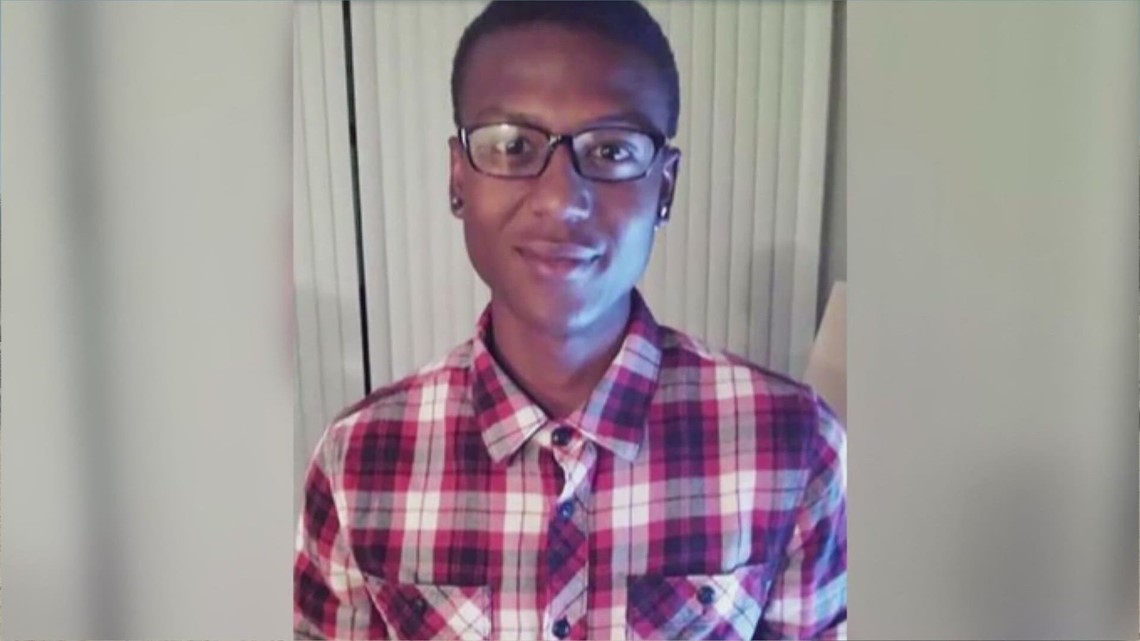AURORA, Colo. — The doctor who performed Elijah McClain's autopsy told jurors Tuesday that McClain died from complications related to the ketamine injection and said he found no physical injuries he could pin on officers' action.
"It's a statement of fact. He received ketamine following forcible restraint," said Dr. Stephen Cina, who performed McClain's autopsy for the Adams County Coroner's Office. "I am not saying he died of ketamine administration and forcible restraint, because if I had thought in my mind the forcible restraint killed him, I’d have made the whole thing homicide. I'm not sure what the role of forcible restraint was."
McClain was first contacted on Aug. 24, 2019, after a teenage boy called 911 and relayed that he saw McClain wearing a coat and mask and acting "suspicious." Less than a minute after police arrived, McClain was taken to the ground and engaged in a struggle with now-suspended Officer Randy Roedema, now-former officer Jason Rosenblatt, and a third officer. During that struggle, McClain was placed in a carotid hold, which can cut off the oxygen supply to the brain.
Later that night, paramedics injected McClain with the sedative ketamine. His heart stopped and he later died.
Roedema and Rosenblatt, who are currently on trial, are among five people indicted in 2021 in connection with McClain's death. Both are charged with reckless manslaughter and second-degree assault.
A third officer and two paramedics will go to trial later this year.


In his November 2019 autopsy report for McClain, Clina said McClain's cause of death was undetermined. At the time he did not have access to all of the body-worn camera footage related to the case or complete medical records.
He amended that report in July 2021 and at that time said McClain's cause of death was "complications from ketamine injection following forcible restraint."
"I know from looking at the video - he received the ketamine and a minute or two later he’s agonally breathing and he went into cardiac and spiraled downward until he died," Cina said. "I'm sure of that."
According to prior court testimony, McClain was given a much larger dose than recommended for someone of his size. Cina said Tuesday, blood tests taken after McClain got to the hospital showed the level of ketamine in his blood was at a therapeutic level.
“He’s not in the lethal range for the general population, but this dose in this person was just too much for him to handle," Cina said.
"Why wasn't this an accident?" questioned Harvey Steinberg, who represents Rosenblatt.
"Some forensic pathologists would consider this whole case an accident. I believe some forensic pathologists would consider the case a homicide, weighing the forcible restraint and saying it must have done something," Cina replied. "I'm in between saying the forced restraint may have done something, but that’s not enough to make it a homicide."
Cina said repeatedly that he could not rule out what role, if any, the force used by officers had in McClain's death. He said aside from a few scrapes from the struggle, he found no other injuries to McClain that he felt he could attribute to the officers' force.
"I am not sure if everything leading up to the ketamine predisposed him to the ketamine reaction or if it didn’t," Cina said. "If there was a way to prove it did predispose him to the ketamine and he would have been fine with the ketamine without the restraint, that’s one thing, but I can’t say that."
Prosecutors relied heavily on body camera footage to demonstrate to the jury that McClain's condition had worsened prior to the ketamine injection but during the time he was restrained by officers. They showed that he uttered his last words, "please, help me," roughly five minutes before he was injected with the ketamine.
They also noted that Cina made a suggestion to bring in a pulmonologist, or lung specialist, to examine the body worn camera footage due to their expertise in that area.
Jurors previously heard from Dr. David Beuther, a doctor at National Jewish Health, who testified about what he observed related to McClain's breathing during the approximately 15 minutes he was restrained on the ground.
Earlier Tuesday, Aurora Police officer Alisha Ward testified that McClain was not in the recovery position on his side but had "toppled over" almost on his stomach in the minutes prior to him being injected with ketamine.
Ward responded to the scene in 2019, after McClain was already on the ground and handcuffed. Video shown in court showed her "quickly" exiting her vehicle and making her way over to where McClain was.
She said she was hurrying over based on calls that had gone over the radios about a physical confrontation of some kind.
She testified that, while on the scene, she saw McClain moving out of the corner of her eye and believed it could have been him "resisting" and told jurors it's possible for someone to resist even if handcuffed. She's used kicking as an example. At one point, Ward testified that she heard McClain groaning and was aware he had vomited.
"You said that you're hearing these sounds of distress and that you are seeing what he’s doing," said prosecutor Jason Slothauber. "Why is the word resisting even in your vocabulary to describe what he’s doing?
"Due to his movements that is characteristic of resisting. I'm not saying that is for sure what was happening, but it could be," Ward replied. "What I knew from radio traffic and what I saw when I got on scene. I thought they had been in a fight previously."
Ward said when she first arrived, McClain was in the recovery position on his side. Later, according to a body camera video shown in court, in the minutes before McClain was injected with ketamine, he had fallen forward with his head slumped toward his stomach.
"Is this the recovery position?" Slothauber asked Ward as he referenced the video clip.
"It does look like his shoulder is over that at this point. I'd say it looks like he was in the recovery position but his head went more toward his stomach," Ward replied. "So no, I guess not."
After her response, Slothauber continued playing the next portion of the same body camera footage.
"Has Mr. McClain moved at all in about the last two minutes?" asked Slothauber after stopping the clip.
"It looks like he's in about the same position," replied Ward.
"By here, he is already fully toppled over onto his stomach, isn't he?" Slothbauer pressed.
"He does look toppled over. Yes," Ward said.
Jeremy Cooper and Peter Chichuniec, the two paramedics who responded to the call, are set for trial in November. They are each charged with reckless manslaughter and numerous counts of assault.
Another officer, Nathan Woodyard, who was the first to respond to the call about McClain, was also indicted on a charge of reckless manslaughter. His trial is set to begin in mid-October.
SUGGESTED VIDEOS: Elijah McClain death

